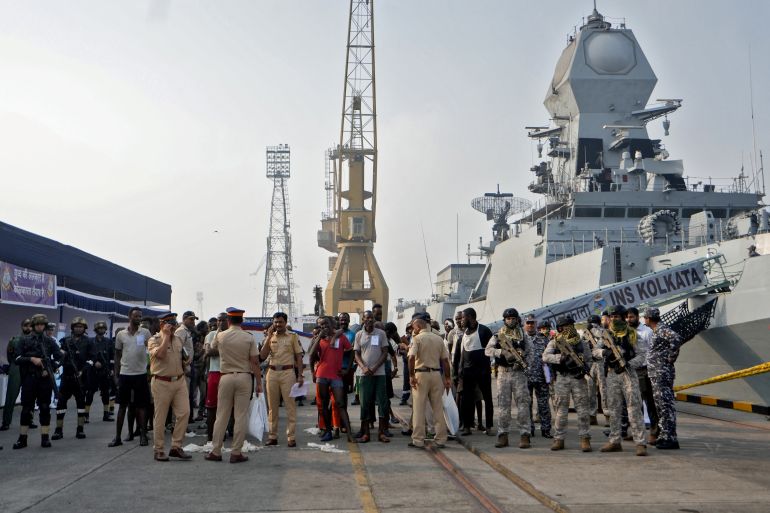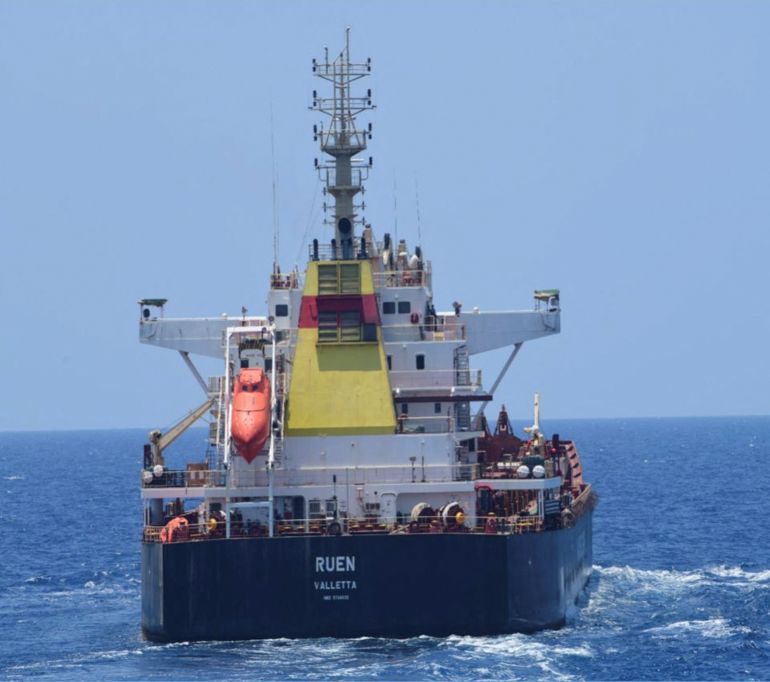Captured Somali pirates arrive in India to face trial over ship hijacking
India has brought 35 captured Somali pirates to Mumbai to stand trial, days after its navy recaptured a hijacked bulk carrier and rescued several hostages.

Indian soldiers stand guard next to the captured Somali pirates after they were broughtin for prosecution by the Indian Navy, at the Naval Dockyard in Mumbai, India [Hemanshi Kamani/Reuters]
India has brought 35 captured Somali pirates to Mumbai to stand trial, days after its navy recaptured a hijacked bulk carrier and rescued several hostages.
The destroyer INS Kolkata, which led the rescue operation, docked in India’s financial capital early on Saturday, a navy statement said.
The hijacking of the Maltese-flagged MV Ruen in December, east of Socotra in the northern Arabian Sea, was the first time since 2017 that any cargo vessel had been successfully boarded by Somali pirates.
Indian naval commandos took control of the vessel on March 17, some 260 nautical miles (480 kilometres) off the coast of Somalia, and rescued 17 crew members – nine from Myanmar, seven from Bulgaria and one from Angola.
The Somalis are expected to be transferred to police custody later on Saturday.
At the peak of Somali pirate attacks in 2011, the navy used to prosecute and jail in India those involved. But in recent months the navy has taken to recapturing vessels and rescuing crew but leaving the disarmed pirates at sea.
Navy spokesman Vivek Madhwal said this week that this marked the first time in more than a decade that pirates captured at sea would be brought to Indian shores to face trial.
Under India’s anti-piracy laws, the men could face the death sentence if they are convicted of a killing or an attempted killing, and life imprisonment for piracy alone.
Last Saturday’s rescue was the culmination of a 40-hour operation. Commandos parachuted out of a military C-17 aeroplane to board the vessel in an assault that “successfully cornered and coerced” all 35 pirates on board to surrender, an earlier navy statement said.
Bulgarian vessel owner Navibulgar called India’s rescue a “major success”.
 The December hijacking of the ship was the first time since 2017 that any cargo vessel
The December hijacking of the ship was the first time since 2017 that any cargo vessel
had been successfully boarded by Somali pirates [Handout via Reuters]
‘Mother ship’
Somali pirates have in the past sought to capture a “mother ship” capable of sailing greater distances so they can target larger vessels.
The European Union Naval Force said the MV Ruen could have been used by pirates for their successful hijacking of the bulk carrier MV Abdullah off Somalia on March 12.
The Bangladesh-flagged MV Abdullah has since been steered into Somali waters, with its 23-member crew still held hostage.
India’s navy has been deployed continuously off Somalia since 2008, but it stepped up anti-piracy efforts last year following a surge in maritime assaults, including in the Arabian Sea and by Yemen’s Iran-aligned Houthi rebels in the Red Sea.
India has deployed at least a dozen warships in the Gulf of Aden and the northern Arabian Sea since December, which enables it to assist vessels east of the Red Sea.
In January, the navy rescued all crew members from a Liberian-flagged merchant vessel after its attempted hijack in the Arabian Sea.
At least 17 incidents of hijacking, attempted hijacking and suspicious approaches have been recorded by the Indian Navy since December 1.
At the peak of their attacks in 2011, Somali pirates cost the global economy an estimated $7bn, including hundreds of millions of dollars in ransom payments.
At least 18 other suspected pirates have been captured by India’s navy this year, including in operations to rescue three Iranian-flagged fishing vessels.
Information on the fate of those hijackers has not been publicly released.
Since the start of the Houthi attacks, launched in response to Israel’s war on Gaza, many cargo ships have slowed down far out at sea to await instructions on whether to proceed. Experts say that has left them vulnerable to attack.
Keep Reading
Pirates seize control of cargo ship near Somalia, say owners
Two vessels freed following Somali pirate hijackings
US says Somali pirates likely behind attempted tanker seizure near Yemen